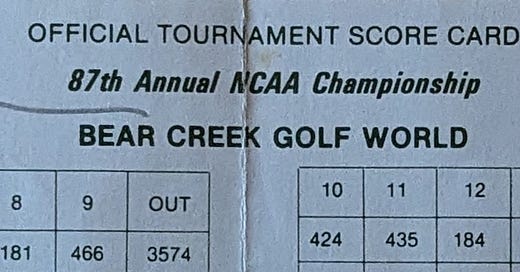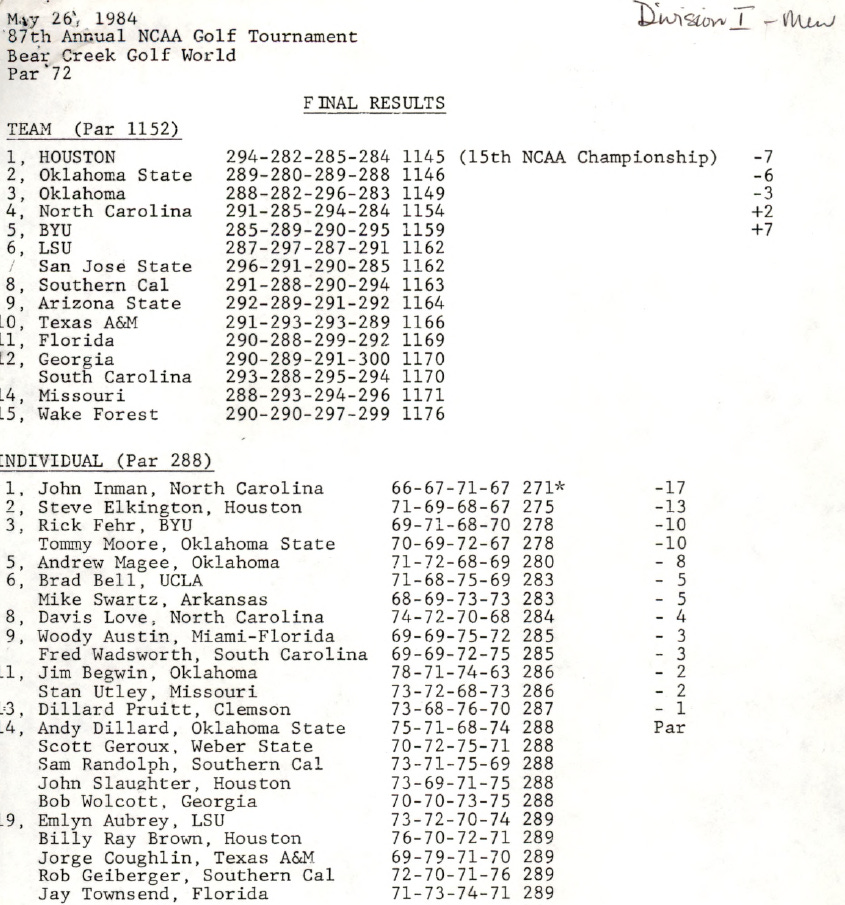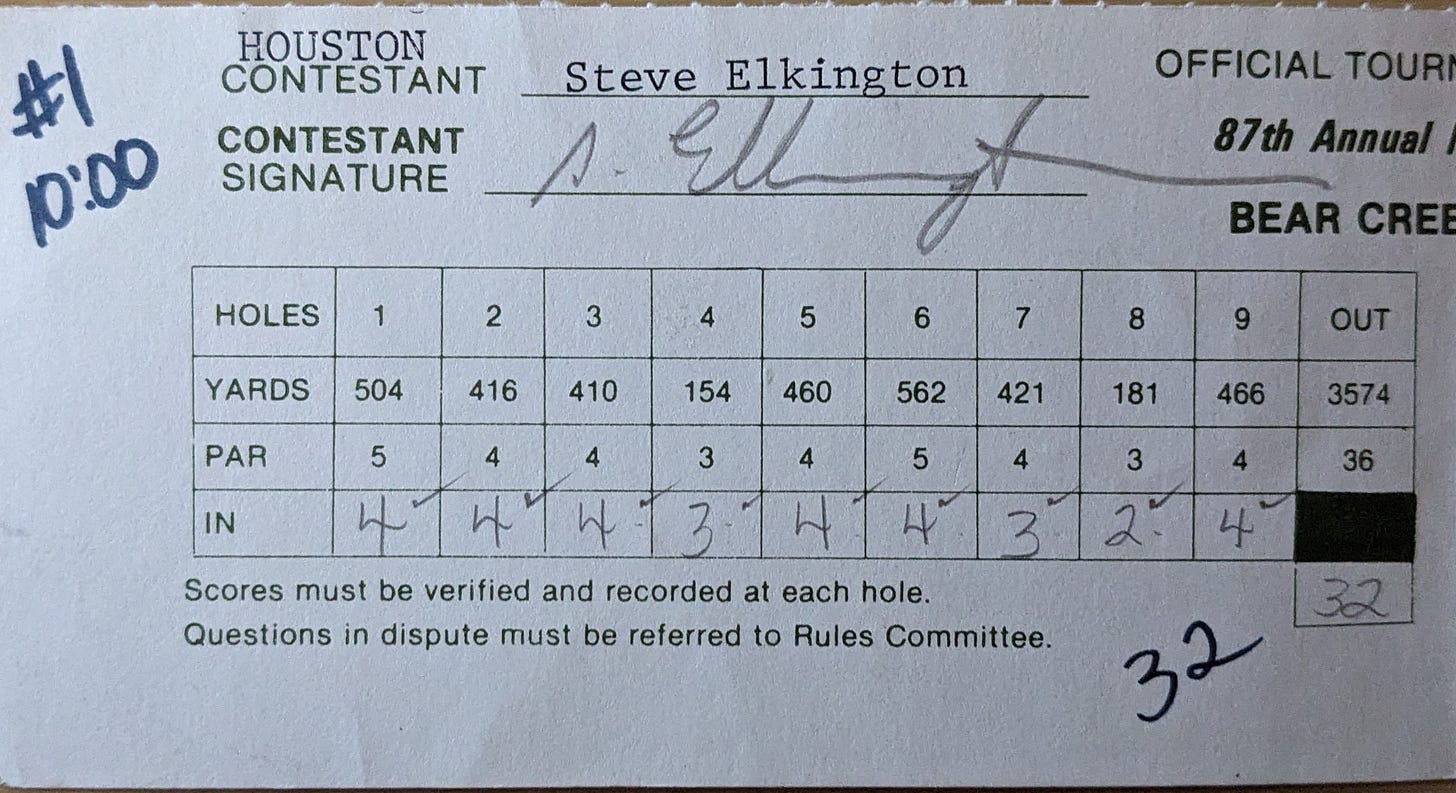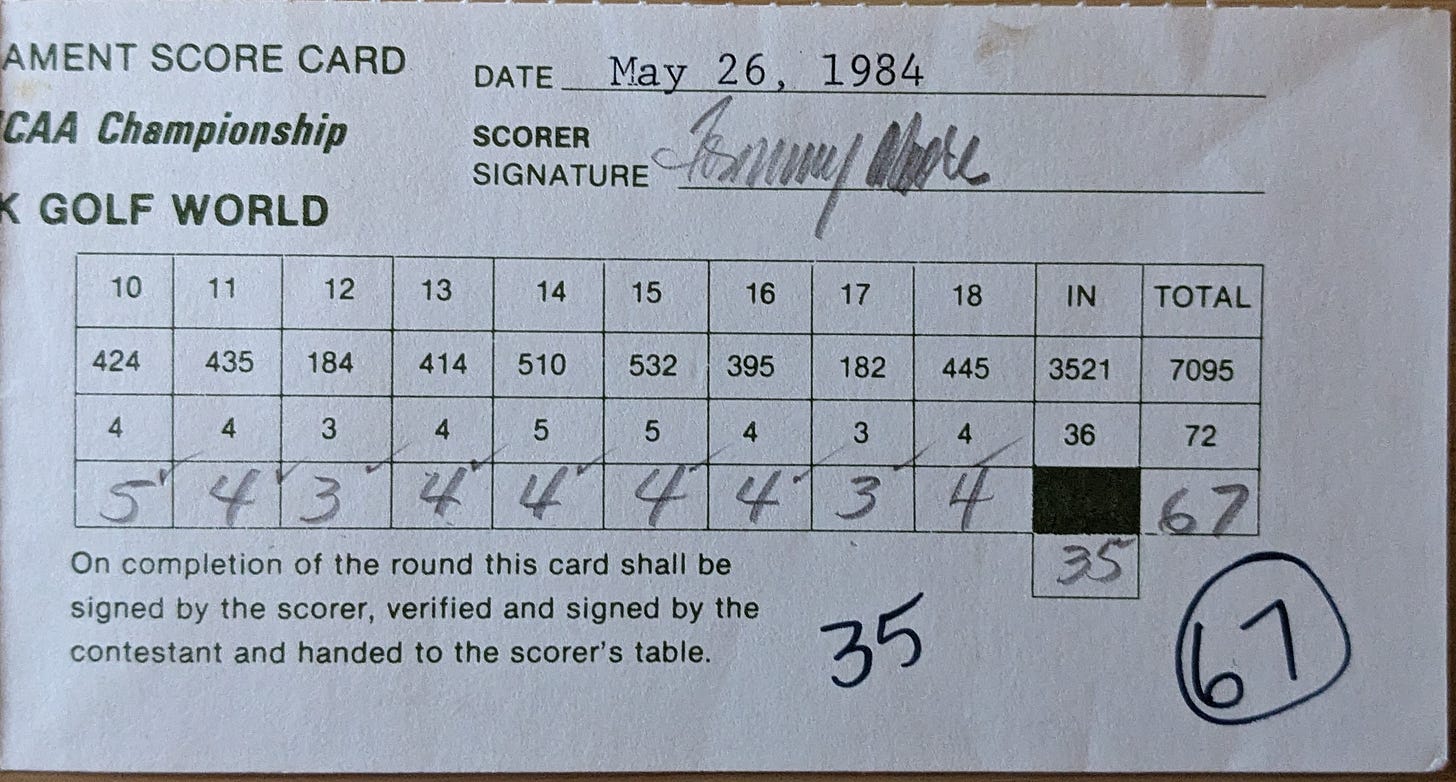College Golf Museum: 1984 NCAA Scorecard
We tend to connect best to history through tangible items. It’s one thing to read about past exploits, but seeing a physical artifact helps bridge our minds to a given moment and unlock the ineffable wonder. How do you properly describe what it feels like to hold a medal won in a competition held before your oldest living relative was born? What words do you use to give weight to the delicate feeling of turning the pages of a tournament program that hasn’t ever been scanned? Even souvenirs so modern it feels blasphemous to call them “relics” are hefty beyond their mass, weighed down by their significance to the history of this great sport. As we take a stroll through the college golf museum, hopefully the pictures below plus a healthy dose of context will provide the perfect extra 1,000+ words.
Join me today in examining an official scorecard from the 1984 D1 Men’s NCAA Championship.
*NOTE: underlined text provides a link to references or sites with more information
1984 NCAA CHAMPIONSHIP
In 1982, the NCAA golf championship committee announced that the 1984 championship had been awarded to Houston. Because the 30+ year Houston coach was always threatening eminent retirement, many apparently believed this would be a way to sort of honor Coach Dave Williams, similar to Oklahoma State hosting the 1973 NCAA championship which honored Coach Labron Harris before he passed the reins to Mike Holder. It’s a fitting connection as the two teams had won or finished runner-up in the majority of the championships in the decade since then, and even twice finished first and second (1977 and 1982).
TOURNAMENT FORMAT
Stroke Play [72 holes]
Team title determined by 72 holes of 5-count-4 (daily)
Individual medalist after 72 holes is individual champion
ROUNDS 1-3
Through three rounds, the home team was behind but looking like they might be able to make a run in the final round. Houston junior Steve Elkington had put together two solid rounds in the 60s to help lead the team back into second place just three strokes behind Oklahoma State. The reigning champion cowboys weren’t afraid of a challenge, though, they just needed a couple of solid rounds from their top players like senior Tommy Moore.
ROUND 4
The following comes from an amazing article written by Tom Kensler for The Oklahoman which perfectly encapsulates the end of the tournament:
The Cowboys were denied a third NCAA title in five years by the University of Houston, the host school, but they were still kicking until an 18-foot birdie attempt by senior Tommy Moore scooted just past the No. 18 cup, the 72nd hole of the 72-hole tournament.
A Hollywood script writer couldn't have set up a more dramatic ending.
The final hole: Houston senior Steve Russell, a fifth-year walk-on playing in his first NCAA Championship, gets up and down for par from behind a bush 10 yards off the green. He nails a 12-foot putt to save a par 4.
Houston freshman Tray Tyner almost gives the Cougars an insurmountable four-stroke lead with a birdie, but his 18-foot attempt misses by two inches.
OSU sophomore Scott Verplank gets word from teammate Kevin Whipple that the Cowboys trail by three strokes. Verplank rattles in a 30-footer for birdie to cut the deficit to two.
Oklahoma State senior Andy Dillard lays a 160-yard approach shot to within eight feet of the pin. OSU coach Mike Holder walks to the edge of the green and tells Dillard, "This is a big-bucks putt in Tyler, Texas (Dillard's hometown). We're down by two, we need it . . . we need it." Dillard drills it dead center for birdie.
OSU's Moore gives his team a chance by knocking an approach shot to within 18 feet. A birdie means a co-championship, because there is no playoff for the team title. Verplank meets Moore on the fringe. Moore understands the situation. Moore rolls a smooth downhill putt but the ball slides just by the cup.
Houston's Steve Elkington two-putts from 25 feet, making a testy three-footer for par, to give coach Dave Williams his 15th NCAA title.
Williams: "Oh Lord, it was tough . . . those Oklahoma State boys were about to drive me crazy. They almost made three birdies on the final hole."
Holder: "Losing is never fun, but I can't imagine a more exciting finish."
UH's Billy Ray Brown: "I thought he (Moore) was going to make it, I really did."
Dillard: "There were 200 putts out there, it just looked like it came down to that one of Tommy's."
Moore: "If I had to do putt it again, I wouldn't do it any differently. I thought it was going in."
Houston registered a four-under-par 284 Saturday to finish with a 72-hole total of 1,145, seven under par. OSU, which led by three strokes entering the final round, shot even par Saturday and finished at 1,146.
HOUSTON WINS 15TH TEAM TITLE
The team victory made for Coach William’s 15th time collecting the Maxwell Cup in his 33 year coaching career. Keeping with the Hollywood script writing, you would think this might be the perfect place for the proud, grizzled coach to ride off into the sunset. But that wasn’t Williams’s way. Almost immediately, the coach often referred to as the “Father of College Golf” was quoted looking forward to “Sweet Sixteen.” With Billy Ray Brown and Steve Elkington returning for their senior seasons, it seemed like a good bet that might come in 1985.
RECORDS FALL
Two very significant records were set during this championship.
Jim Begwin’s 63 (-9)
In the final round, Oklahoma’s Jim Begwin shot an incredible 9-under par 63 which finally broke through the NCAA championship record 65 which 8 players shared: Hale Irwin (1971), John Mills (1971), Ben Crenshaw (1971), Tom Kite (1972), Bob Gilbert (1973), Curtis Strange (1974), Billy Ray Brown (1982), and Danny Briggs (1982).
John Inman’s 271 (-17)
Inman matched Elkington’s final round 67 to preserve his four stroke lead. He had led from the start with an opening round 66 and never really looked back. The only “hiccup” in a near flawless victory came in the third round; at least if you can call a one-under-par 71 a hiccup. Inman shot 66-67-71-67 to give him a 17-under total of 271. He led wire-to-wire on the way to an individual national title that also broke Ben Crenshaw’s [Texas] 1971 NCAA championship record of 15-under-par.
SCORECARD SIGNATURES
Steve Elkington [Houston]
Steve Elkington, who is said to be one of the first prominent college golfers from Australia, was one of 19 players in the field who came to the US from another country to play collegiate golf. His runner-up performance in the 1984 championship was a magnificent conclusion to a 1st Team All-American season that included five top 5 finishes and a Southwest Conference individual title (which he shared with teammate John Slaughter). He actually led the field in the NCAA championship with 20 birdies over the four rounds which accounted for over a third of Houston’s birdie total for the tournament.
Elkington returned to Houston in 1985 for his senior season, and again led the team to a national championship. He is one of the few players in NCAA championship history to not only win multiple team titles, but also lead his team in scoring. In fact, across all of Houston’s eventual 16 national championship teams, Elkington and Marty Fleckman are the only ones to accomplish this feat. The 1984 and 85 seasons were also special for Elkington as he captured back-to-back Southwest Conference individual titles. In all, he racked up 6 individual victories which ranks 2nd all-time for Houston, tied with Fred Couples.
Steve Elkington turned pro in 1985 and went on to have a very successful career on the PGA Tour after earning his card for the 1987 season. His first pro victory came at the 1992 Australian Open. A few months later he made a spectacular run in the 1993 Masters where he finished T3. His 10 PGA Tour victories includes the 1995 PGA Championship and two Players Championships (1991 and 1997). He also finished T2 in the 2002 British Open when he and 3 other players fell to eventual champion Ernie Els in a playoff. In all, he has ten career top 10 finishes in the majors, and another three in the Players Championship.
Recognizing all of these accomplishments and many more - such as participating in the first four Presidents Cups - Steve Elkington was inducted into the Texas Golf Hall of Fame in 2017.
Tommy Moore [Oklahoma State]
This particular scorecard has one last special attribute which comes from the man who actually wrote all over it. Elkington’s scorer in the final round was Oklahoma State’s Tommy Moore who also shot a 67. The senior cowboy’s 3rd place finish - just three shots behind Elkington - was his best individual finish in the NCAA championships.
Tommy Moore left Oklahoma State with three-time All-American plaques and a ring as a member of the 1983 NCAA championship team. He was also Oklahoma State’s first Academic All-American (1984). Moore continued to play pro golf until his life was cut tragically short in 1998 when he passed away from a rare blood disease at just 35 years old.
Considered one of the best junior players in his class - at one point was ranked the #1 junior in the country by Golf Digest - it’s fitting that a junior tournament, the Tommy Moore Memorial Junior Golf Championship, is held in his honor annually in conjunction with the All-State Sugar Bowl.
I confess that at first I did not understand the significance of having Moore’s signature on this scorecard. Now, however, I appreciate this aspect for how incredibly special it is and hope that this post might, in some small way, help Tommy Moore’s legacy live on.

Thanks for reading!













